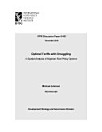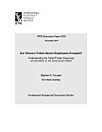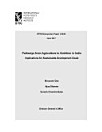Using household consumption and expenditure surveys to make inferences about food consumption, nutrient intakes and nutrition status
Fiedler, John L. · Mwangi, Dena M.
nov 2016 · IFPRI Discussion Paper Libro 1 · Intl Food Policy Res Inst
Ebook
64
pagine
family_home
Idoneo
info
reportValutazioni e recensioni non sono verificate Scopri di più
Informazioni su questo ebook
Household consumption and expenditure surveys (HCES) are multipurpose surveys that are routinely conducted to collect data on household food consumption and availability in more than 120 countries. HCES are increasingly being used to calculate proxy estimates of food consumption, nutrient intakes, and nutrition status, often at the individual level. Rarely, however, do they collect information on meal participation, despite growing evidence that it is an increasingly important and variable component of the quantity of food consumed or available in a household. This paper explores the significance of adjusting for meal participation in making inferences about apparent food consumption and nutrient intakes. It focuses on two distinct sets of additional information requirements for enhancing the reliability and precision of measures of food consumption: (1) individual household members’ and household guests’ meal-eating behaviors, and (2) the number and apparent nutritional significance of meals. While the most comprehensive and precise accounting of intakes of individual food consumption and nutrients requires both types of information, the magnitude of the changes required in HCES questionnaires to capture them is likely to be prohibitive. Consequently, for many HCES, a “second best” approach may be the most effective method, at least in the short term. The paper empirically explores some of the relatively few HCES that currently attempt to capture some of these information requirements. In addition, it assesses their value-added to prioritize the global agenda for strengthening HCES measurement of food consumption in support of more evidence-based nutrition policy making.
Valuta questo ebook
Dicci cosa ne pensi.
Informazioni sulla lettura
Smartphone e tablet
Installa l'app Google Play Libri per Android e iPad/iPhone. L'app verrà sincronizzata automaticamente con il tuo account e potrai leggere libri online oppure offline ovunque tu sia.
Laptop e computer
Puoi ascoltare gli audiolibri acquistati su Google Play usando il browser web del tuo computer.
eReader e altri dispositivi
Per leggere su dispositivi e-ink come Kobo e eReader, dovrai scaricare un file e trasferirlo sul dispositivo. Segui le istruzioni dettagliate del Centro assistenza per trasferire i file sugli eReader supportati.







